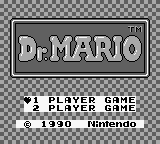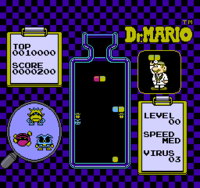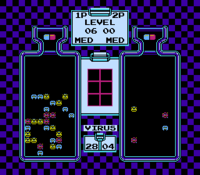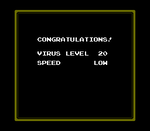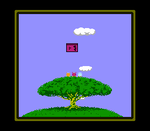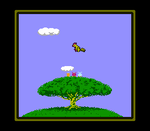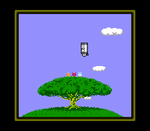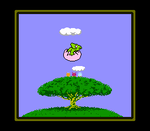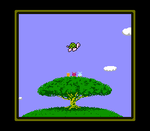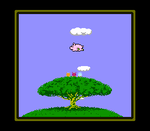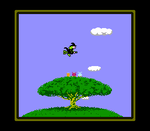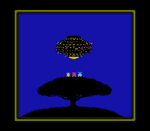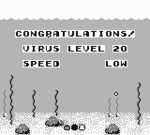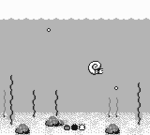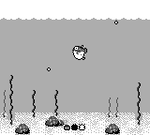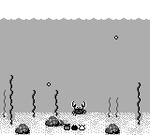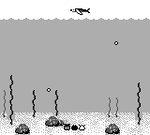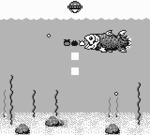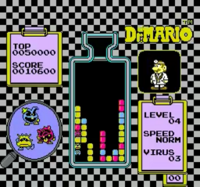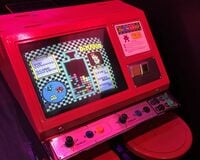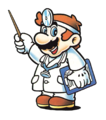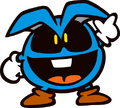Dr. Mario (game): Difference between revisions
m (Text replacement - "{{VirtualConsole}}" to "{{Virtual Console}}") |
No edit summary |
||
| Line 7: | Line 7: | ||
|publisher=[[Nintendo]] | |publisher=[[Nintendo]] | ||
|release='''Famicom/NES:'''<br>{{release|Japan|July 27, 1990|USA|October 14, 1990|Europe|June 27, 1991|Australia|June 27, 1991}} '''VS. System:'''<br>{{release|USA|1990|Australia|1990|Europe|1990}} '''Nintendo PlayChoice-10:'''<br>{{release|USA|1990|Europe|1990|Australia|1990}} '''Game Boy:'''<br>{{release|Japan|July 27, 1990|USA|December 1, 1990<ref>''Super Smash Bros. for Wii U'' [[smashwiki:Masterpieces|Masterpieces]]</ref>|Europe|April 30, 1991}} '''Satellaview:'''<br>{{release|Japan|March 30, 1997}} '''Super Famicom ([[Nintendo Power (cartridge)|NP]]):'''<br>{{release|Japan|June 1, 1998<ref>[http://themushroomkingdom.net/games/drm-np Date info of ''Dr. Mario'' (NP) from TMK], retrieved 11/26/2012</ref>}} '''Game Boy (NP):'''<br>{{release|Japan|March 1, 2000}} '''Game Boy Advance:'''<br>{{release|Japan|May 21, 2004|USA|October 25, 2004|Europe|January 7, 2005}} '''[[Virtual Console#Nintendo 3DS|Virtual Console (3DS)]]:'''<br>{{release|Japan|July 27, 2011|Europe|March 22, 2012|Australia|March 22, 2012|USA|October 4, 2012|South Korea|May 18, 2016}} '''[[Virtual Console#Wii U|Virtual Console (Wii U)]]:'''<br>{{release|Europe|February 13, 2014|Australia|February 14, 2014|Japan|February 26, 2014|USA|March 27, 2014}} '''NES Classic Edition/Famicom Mini:'''<br>{{release|Japan|November 10, 2016|Australia|November 10, 2016|USA|November 11, 2016|Europe|November 11, 2016}} '''Nintendo Entertainment System - Nintendo Switch Online:'''<br>{{release|USA|September 18, 2018|Japan|September 19, 2018|Europe|September 19, 2018|Australia|September 19, 2018|HK|April 23, 2019|South Korea|April 23, 2019}} '''''The UFO cover-up.'':'''<br>{{release|USA|December 12, 2018|Japan|December 12, 2018|Europe|December 12, 2018|Australia|December 12, 2018}} | |release='''Famicom/NES:'''<br>{{release|Japan|July 27, 1990|USA|October 14, 1990|Europe|June 27, 1991|Australia|June 27, 1991}} '''VS. System:'''<br>{{release|USA|1990|Australia|1990|Europe|1990}} '''Nintendo PlayChoice-10:'''<br>{{release|USA|1990|Europe|1990|Australia|1990}} '''Game Boy:'''<br>{{release|Japan|July 27, 1990|USA|December 1, 1990<ref>''Super Smash Bros. for Wii U'' [[smashwiki:Masterpieces|Masterpieces]]</ref>|Europe|April 30, 1991}} '''Satellaview:'''<br>{{release|Japan|March 30, 1997}} '''Super Famicom ([[Nintendo Power (cartridge)|NP]]):'''<br>{{release|Japan|June 1, 1998<ref>[http://themushroomkingdom.net/games/drm-np Date info of ''Dr. Mario'' (NP) from TMK], retrieved 11/26/2012</ref>}} '''Game Boy (NP):'''<br>{{release|Japan|March 1, 2000}} '''Game Boy Advance:'''<br>{{release|Japan|May 21, 2004|USA|October 25, 2004|Europe|January 7, 2005}} '''[[Virtual Console#Nintendo 3DS|Virtual Console (3DS)]]:'''<br>{{release|Japan|July 27, 2011|Europe|March 22, 2012|Australia|March 22, 2012|USA|October 4, 2012|South Korea|May 18, 2016}} '''[[Virtual Console#Wii U|Virtual Console (Wii U)]]:'''<br>{{release|Europe|February 13, 2014|Australia|February 14, 2014|Japan|February 26, 2014|USA|March 27, 2014}} '''NES Classic Edition/Famicom Mini:'''<br>{{release|Japan|November 10, 2016|Australia|November 10, 2016|USA|November 11, 2016|Europe|November 11, 2016}} '''Nintendo Entertainment System - Nintendo Switch Online:'''<br>{{release|USA|September 18, 2018|Japan|September 19, 2018|Europe|September 19, 2018|Australia|September 19, 2018|HK|April 23, 2019|South Korea|April 23, 2019}} '''''The UFO cover-up.'':'''<br>{{release|USA|December 12, 2018|Japan|December 12, 2018|Europe|December 12, 2018|Australia|December 12, 2018}} | ||
|languages={{languages|en_us=y|jp=y}} | |||
|genre=[[Genre#Puzzle|Puzzle]] | |genre=[[Genre#Puzzle|Puzzle]] | ||
|modes=1-2 players | |modes=1-2 players | ||
Revision as of 09:21, June 14, 2022
| It has been suggested that this page be split into the following: Dr. Mario (game), VS. Dr. Mario. (discuss) |
- This article is about the game. For other uses, see Dr. Mario (disambiguation).
| Dr. Mario | |||||||||
|---|---|---|---|---|---|---|---|---|---|
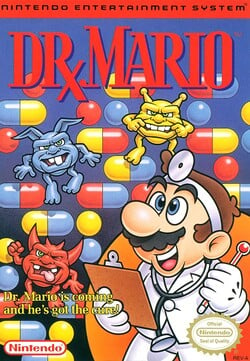 NES box art 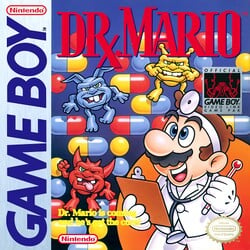 Game Boy box art For alternate box art, see the game's gallery. | |||||||||
| Developer | Nintendo R&D 1 | ||||||||
| Publisher | Nintendo | ||||||||
| Platform(s) | Famicom/NES, Game Boy, Nintendo PlayChoice-10, VS. System, Game Boy Advance, Satellaview, SNES/Super Famicom, Virtual Console (Nintendo 3DS, Wii U), NES Classic Edition/Nintendo Classic Mini: Family Computer, Nintendo Entertainment System - Nintendo Switch Online | ||||||||
| Release date | Famicom/NES: Template:Release VS. System: Template:Release Nintendo PlayChoice-10: Template:Release Game Boy: Template:Release Satellaview: Template:Release Super Famicom (NP): Template:Release Game Boy (NP): Template:Release Game Boy Advance: Template:Release Virtual Console (3DS): Template:Release Virtual Console (Wii U): Template:Release NES Classic Edition/Famicom Mini: Template:Release Nintendo Entertainment System - Nintendo Switch Online: Template:Release The UFO cover-up.: Template:Release | ||||||||
| Language(s) | English (United States) Japanese | ||||||||
| Genre | Puzzle | ||||||||
| Rating(s) |
| ||||||||
| Mode(s) | 1-2 players | ||||||||
| Input | NES:
Wii U: Nintendo Switch: Game Boy:
Game Boy Advance: Nintendo 3DS: NES Classic Edition:
| ||||||||
Dr. Mario (stylized as "D℞. MARIO" on the western logo) is an arcade-style puzzle video game created by Nintendo, and was released for the Nintendo Entertainment System and Game Boy in 1990. The gameplay is very similar to that of Tetris, although in Dr. Mario, the object is to line up vitamins to destroy viruses.
Story
The following text is taken directly from the instruction manual.
Hi everybody! I'm Mario. How's it going? Over the last few years, I've been involved in some pretty wild adventures. Now, believe it or not, I work in the virus research lab at the Mushroom Kingdom Hospital. Today I'm about to begin my research as usual.
"Dr. Mario, something terrible has happened!"
"What's wrong, nurse Toadstool?" "One of the experiments has gone out of control. The viruses are spreading quickly!"
"Oh No! We've got to do something! I have just developed a new vitamin that should be able to take care of it. I sure hope this stuff works!"
Dr. Mario works in a virus research lab at the Mushroom Kingdom Hospital, alongside Nurse Toadstool. When one of the experiments goes wrong, the hospital is flooded with tri-color viruses. Armed with vitamin capsules–a medicine of his own invention–Dr. Mario sets out to neutralize the outbreak.
Gameplay
In this game, the interface is presented with a giant bottle, which features a grid that is 8 tiles long and 16 tiles tall. When the stage stars, viruses will populate the bottle, and they come in three varieties: Chill (blue), Fever (red), and Weird (yellow).
The main objective of the game is to clear the viruses in the bottle. This objective can be fulfilled with the help of multi-colored capsules called vitamin capsules. The vitamins have two segments, where each half can come in three colors, and both halves can even have the same color. To eliminate a virus with them, they must be lined up with at least one like-colored virus in a column or row so that the line consists of at least four in a row or column. When that happens, both the viruses and vitamins in that line disappear. These vitamins can also be cleared if four or more of the same colored pieces are arranged in a line, even if there are no viruses within them. The viruses remaining is represented by the three viruses under the magnifying glass around the bottom-left, where they slowly revolve along the glass. If at least one virus is eliminated, the corresponding virus color will flinch and the viruses will stop moving. If all viruses of that color are gone from the bottle, that corresponding virus under the glass will also disappear after flinching. After a number of vitamins are brought to the bottle, a five-note chime will be played which will signify that the speed of the capsule drops increased.
If vitamins are stacked so that one of the two middle spots at the top of the bottle is occupied, the player receives a Game Over.
Characters
Game modes
1-Player Game
When a 1-Player game is started, the player has three options: Virus Level, Speed, and Music Type. For Virus Level, one of the 21 levels (from 0 to 20) can be chosen. This determines the number of viruses at the beginning is equal to four times the level number plus four, all the way up to level 20. Although the level number can go up to 24 in the NES version, there will always be 84 viruses at the beginning of levels 20 and above[1]. The Speed setting determines the speed of the vitamins as they fall, which are between: Low, Med (medium), or Hi (high). The Music Type is a choice between Fever, Chill, or Off (no music). For the Game Boy version, the music can be previewed by highlighting the option, whereas this feature is not present in the NES version.
In a 1-Player Game, the score is tracked. In order to earn points, viruses must be eliminated, as just clearing only capsules or forcefully dropping capsules will not contribute to the score. The amount of points earned from eliminating viruses is dependent on the Speed setting, where the base score is 100 for Low, 200 for Med, and 300 for Hi. Additionally, if the player eliminates more than one virus in a single move, the subsequent viruses contribute more points. After clearing all the viruses and finishing the level, the score is carried over to the next level. The basic scoring is as follows:
| Virus # | Low | Med | Hi |
|---|---|---|---|
| 1 | 100 | 200 | 300 |
| 2 | 200 | 400 | 600 |
| 3 | 400 | 800 | 1200 |
| 4 | 800 | 1600 | 2400 |
| 5 | 1600 | 3200 | 4800 |
| 6+ | 3200 | 6400 | 9600 |
In the NES version, a fanfare will not sound after clearing more than one line in a single move. However in the Game Boy version, a fanfare will be played depending on the amount of lines made, and a special fanfare is played after clearing four or more lines in a single move, something that is not present in other versions.
2-Player Game
A 2-Player Vs. game mode is also available for selection. In this mode, two players battle to either clear their grid first, or cause their opponent to get a Game Over through causing an object to reach the middle of the topmost row. The game ends after one of the players wins three rounds. The Level and Speed options are chosen independently by each player before the game begins. For the Game Boy version, a Game Link cable is required to play the 2-player Vs. game mode. On the 3DS Virtual Console version, 2-player mode is not supported.
During a two-player head-on-head game, whenever a vitamin resulted in a chain or combo with more than one line cleared, a corresponding number of garbage, basically single vitamin pieces of colors based on the colors cleared by a player, will drop into their opponent's bottle at a slow pace, similar to the speed of a capsule falling normally in the Hi speed. The number of garbage that drops depends on the amount of lines cleared, so for example, clearing two lines in a move will cause two pieces to fall. The dropped pieces will simultaneously be either in the odd-numbered columns or even-numbered columns. If two pieces drop, both of them are always four columns apart, and if three pieces drop, they will all be two columns apart of each other and won't be two pieces that will be four columns apart.
Controls
/
: Move cursor on the menu screen
/
(left/right): Move vitamin capsule
/
(down): Drop vitamin capsule
/
: Rotate vitamin capsule clockwise
/
: Rotate vitamin capsule counterclockwise
/
: Start the game; Pause or unpause game during gameplay,
/
: Move cursor on the title screen
Cutscenes
After completing certain levels at certain speeds, a short cutscene will occur, along with text that consists of a "CONGRATULATIONS!" message and the Virus Level and Speed that the player has beaten. The cutscenes are different between the NES version and the Game Boy version. If the cutscene has something that moves in it, the text on the screen will disappear or appear depending on the version: they appears before the cutscene is played in the NES version, whereas they start to appear after the cutscene is played in the Game Boy version.
NES
In most of the cutscenes, they start with the viruses will be sitting on the tree. Graphics for a snowman and a round ball exist that are likely used in a cutscene, but they ended up unused.[2]
Game Boy
In every cutscene, they start with the viruses sitting at the sea floor.
Reception
The Game Boy version of the game was placed 45th in the 100th issue of Nintendo Power's "100 best Nintendo games of all time" in 1997.[3] The NES version placed 69th in the 200th Issue of GameInformer's "Top 200 Games of All Times". The game placed 51st in IGN's Top 100 NES Games list.[4]
Reviews for the game were generally positive, although there has been some criticism from parents about the medicine in a children's game. ACE in particular was more negative, giving the Game Boy version 510/1000, criticizing the repetitive gameplay and uninspired graphics. They also stated that the game "reeks of plagarism", stating that it was worse than the original games it was modeled after.[5] GameRankings gave the game 69.25%, while review aggregator Metacritic gave it a 66 out of 100 based on 10 reviews.
Remakes and ports
VS. Dr. Mario
The game was later released on the VS. System under the name VS. Dr. Mario. Players can spend only 20 seconds on the settings menu. This version drops the Slow speed and renames the Medium speed to Normal. Normal speed has a grey background while High is now purple. There is no option to turn off the music.
The scoring system is also less generous. In the NES version, the first virus killed by a vitamin capsule yields 200 points (on Medium speed), the second 400, the third 800, the fourth 1600, so each virus is worth twice as much as the last. In the VS. version, the first virus is worth 200, then 400, then 600, then 800, so a virus is worth only 200 points more, and not twice as many points, as the previous virus.
Satellaview
A slightly altered version of Dr. Mario known as Dr. Mario BS Version 「Dr.マリオBS版」 was broadcast for the Satellaview system between March 1997 and June 2000. It has the same graphics and music that was used in the remake from Tetris & Dr. Mario which was not released in Japan. It should also be mentioned that the complete game is still in the ROM, just locked out.[6]
List of re-releases and ports
- Dr. Mario was ported into the Nintendo PlayChoice-10 arcade machines in North America.
- In 1994, Nintendo released the remake for SNES, as a part of the Tetris & Dr. Mario cartridge.
- In 2004, Nintendo re-released the original NES version for the Game Boy Advance, as part of the Classic NES Series.
- In 2005, Nintendo again released Dr. Mario for Game Boy Advance, but this time as an enhanced remake in Dr. Mario & Puzzle League.
- On March 22, 2012, the Game Boy version was released on the Nintendo 3DS's Virtual Console in PAL regions and it was released in Japan and North America on October 2nd and 3rd respectively later that year.
- A trial version of the Game Boy game appears as a unlockable Masterpiece in Super Smash Bros. for Wii U.
- Dr. Mario is one of the games that appear in NES Remix 2 and Ultimate NES Remix. It is the final challenge in Championship Mode.
- A trial version of the NES game appears as a "highlight" in amiibo tap: Nintendo's Greatest Bits.
- The NES and Famicom version of Dr. Mario is one of the 30 games included in the NES Classic Edition and Nintendo Classic Mini: Family Computer, respectively.
- Dr. Mario was made available as one of the 20 NES titles at Nintendo Entertainment System - Nintendo Switch Online's launch in September 2018, and can be played competitively with other players online.[7] A special edition titled Dr. Mario: The UFO cover-up. that starts the player at level 20 and Hi speed was also added on December 12, 2018.
Microgame
WarioWare, Inc.: Mega Microgame$! featured a microgame version of Dr. Mario. There is also an unlockable mini game version entitled Dr. Wario.
Another microgame based on this game appeared in WarioWare Gold.
Development
Dr. Mario was originally under the title "Virus", which had similar gameplay, but the goal was to cure viruses in a sick animal. What appears to be Nurse Toadstool is also visible in the game.[8]
Gallery
- For this subject's image gallery, see Gallery:Dr. Mario (game).
Media
NES
| File info 0:30 |
| File info 0:30 |
| File info 0:30 |
| File info 0:23 |
| File info 0:30 |
| File info 0:22 |
| File info 0:24 |
| File info 0:30 |
| File info 0:30 |
| File info 0:30 |
Game Boy
| File info 0:30 |
| File info 0:30 |
| File info 0:30 |
| File info 0:02 |
| File info 0:30 |
| File info 0:30 |
| File info 0:02 |
| File info 0:01 |
| File info 0:08 |
Staff
- Main article: List of Dr. Mario staff
Names in other languages
| Language | Name | Meaning | Notes |
|---|---|---|---|
| Japanese | ドクターマリオ[?] Dokutā Mario |
Dr. MARIO | |
| Chinese (simplified) | 马力欧医生[?] Mǎlì'ōu Yīshēng |
Dr. Mario | |
| Chinese (traditional) | 瑪利歐醫生[?] Mǎlì'ōu Yīshēng |
Dr. Mario |
Dr. Mario: The UFO cover-up.
| Language | Name | Meaning | Notes |
|---|---|---|---|
| Japanese | ドクターマリオ 知る人ぞ知るUFO直前バージョン[?] Dokutā Mario Shiru Hitozo Shiru Yūfō Chokuzen Bājon |
Dr. MARIO: "Just Before the UFO Known to the Few" Version |
References
- ^ Dr. Mario AI Defeats Level 24 and Beyond
- ^ https://tcrf.net/Dr._Mario_(NES)#Unused_Sprites
- ^ http://www.gamekult.com/communaute/forum/voirmessage.html?foid=13000909, retrieved 5-31-2009
- ^ [1]
- ^ [2]
- ^ TCRF - Tetris & Dr. Mario#BS and NP Dr. Mario
- ^ Nintendo Entertainment System – Nintendo Switch Online. Nintendo. Retrieved May 8, 2018.
- ^ https://twitter.com/VGArtAndTidbits/status/808922353451302912
External links
- Nintendo UK Game Boy Advance site
- Japanese website (Game Boy)
- Japanese website (Super Famicom Nintendo Power)
| Game Boy games | |
|---|---|
| Super Mario franchise | Alleyway (1989) • Baseball (1989) • Super Mario Land (1989) • Golf (1989) • Dr. Mario (1990) • Super Mario Land 2: 6 Golden Coins (1992) • Donkey Kong (1994) • Mario's Picross (1995) • Picross 2 (1996) |
| Donkey Kong franchise | Donkey Kong (1994) • Donkey Kong Land (1995) • Donkey Kong Land 2 (1996) • Donkey Kong Land III (1997) |
| Yoshi franchise | Yoshi (1991) • Yoshi's Cookie (1992) • Tetris Attack (1996) |
| Wario franchise | Wario Land: Super Mario Land 3 (1994) • Wario Blast: Featuring Bomberman! (1994) • Wario Land II (1998) |
| Miscellaneous | Tetris (1989) • The Legend of Zelda: Link's Awakening (1993) • Game & Watch Gallery (1997) • Game & Watch Gallery 2 (1997) |
